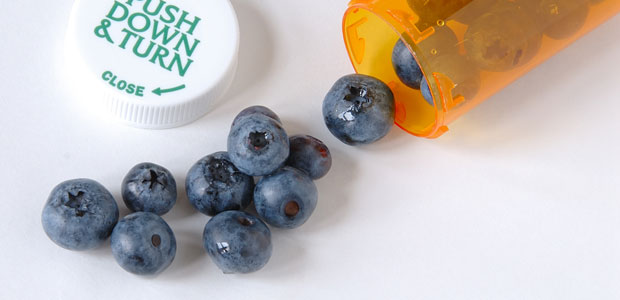Advertisement
Cancer Researcher Goes Holistic
Dr. Burford-Mason

“If 30 percent of cancers can be prevented by changing our diets, why aren’t we doing that?” asks Dr. Aileen Burford-Mason during a phone interview she’s shoehorned into her busy schedule.
“People who don’t eat fruits and vegetables–and we can show this over and over again–have a higher risk of cancer.”
When Burford-Mason says “we,” she can accurately include herself–formerly the director of the Cancer Research Laboratory at Toronto General, she is now president of the Holistic Health Research Foundation of Canada (holistichealthresearch.ca). She is one of those rare hybrids: a medically trained researcher who’s also an advocate for natural health.
Roots In Nutrition
So how did a mainstream biomedical researcher become interested in nutritional supplements? Even in her undergraduate days studying biochemistry, Burford-Mason was interested in the connections between nutrition and disease. “I had this feeling that what we would eventually show was that marginal deficiencies of many nutrients, over prolonged periods of time, would lead to disease.”
Later, while working full-time and completing her PhD, she was confounded by the respiratory tract infections that her five-year-old son kept developing. “He was constantly needing antibiotics every time [he got sick]. I’d be in the middle of an experiment, and I would have to leave to pick him up from school.
“About that time, I read an article on the nutritional needs of immune cells in one of the medical journals. So next time my son was ill, instead of giving him antibiotics, I gave him tiny amounts of these key vitamins and minerals–and he never needed antibiotics again,” she says laughing, “until he moved away from home and stopped taking his supplements!
“I began to see then that, if the body got sick, it was because it didn’t have the tools to maintain itself, to replace or repair structures properly. I’ve been interested in nutrition ever since.”
There is now a “considerable body of evidence to suggest that lack of fruits and vegetables, and diets high in sugar and starch, increase the risk of many cancers,” she says. “A high-glycemic load is a risk for cancer, big time. It’s a risk for all degenerative diseases.”
Research Goes Back For the Future
Researching nutritional supplements, or centuries-old traditional healing practices, Burford-Mason tells me, isn’t the same as researching a pharmaceutical. “You can’t test them in the same way you can test a pill or a drug. In drug trials, the training of the person who prescribes the drug is standard. The way the drug is given is the same, and you don’t change the dose from one week to the next. Now that’s easy to research.
“But when you’re going to a TCM [traditional Chinese medicine] practitioner or an Ayurvedic doctor, they’re using diet and exercise and acupuncture and massage and so forth, and they’re using different combinations on different individuals with the same diagnosis. They’re modifying what they do at the next visit, depending on how you responded at the first visit. So the intervention is complex.”
This holistic approach is a challenge for the current paradigm of scientific research. “There are too many variables,” she explains. “The only thing you can do is look for outcomes. That’s not a lot different from the way they developed knowledge over 5,000 years in TCM: it was a systematic studying of outcomes, and it’s really what we have to go back to now.”
The Wellness Model
In addition to developing new models for research, Burford-Mason’s work with the Holistic Health Research Foundation also includes promoting awareness of a wellness model of health care.
As it is now, “you wait until you get sick, and then you go to a doctor to get it fixed. What the public is beginning to discover is that there are often problems with the fixing.” Symptoms can be treated, but there may be side effects, and root causes may not be adequately addressed.
The wellness model encourages patients to take responsibility for their own health–before things go off the rails. At Burford-Mason’s private practice as a biochemical nutritional consultant, she “often sees people for whom it’s the last ditch, in the sense that cancer patients may end up in my office when they have no other options.”
“Unfortunately, I don’t get as many people as I would like coming to me saying, ‘I’m really
well and healthy, and I’d like to stay that way’.”
I can’t resist asking her, at this point, what I can do to stay well and healthy. “If there are two things that have the biggest impact of all,” she says, “one would be diet and the other would be exercise.
?Dietandexercise’ is all one word in my vocabulary. You can’t be a couch potato and eat
perfectly, or exercise like crazy and not care about what you eat. Both have a powerful effect on your health.”
Challenges and Advances In Integrative Cancer Care
“Our biggest challenge is getting our voices heard by politicians, saying we really have to put money into prevention,” says Burford-Mason.
But we’re also making advances. “We’re finding out more about natural interventions. For instance, some of the components of fruits and vegetables, the phytochemicals, are actually natural chemotherapeutic agents. “Tumour cells have been shown very recently to contain an enzyme–it’s present in all types of tumour cells and not in healthy cells–and some of the phytochemicals, like resveratrol, are converted by that enzyme into a natural chemotherapeutic agent that will kill the [cancer] cell. And what will [resveratrol] do to normal cells? It’ll act as an antioxidant and protect it.”
Thanks to the work of research scientists like Burford-Mason we have the science now to show the irrefutable connections between nutrition and our health.




